Iftar Time in Dubai during Ramadan 2023: A Complete Guide

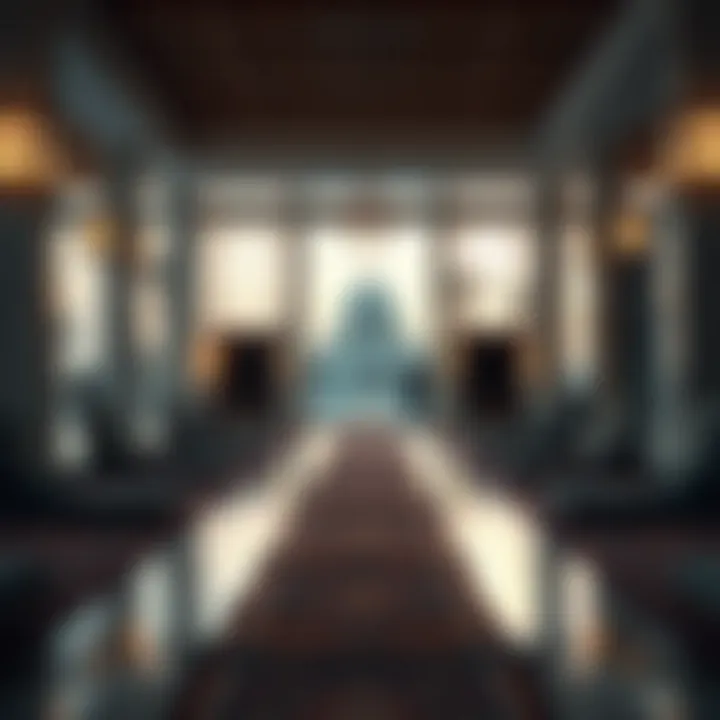
Intro
In Dubai, the month of Ramadan encapsulates a unique blend of spirituality and cultural tradition, particularly evident during iftar—the evening meal that breaks the daily fast. Each year, as the sun dips below the skyline, this moment transforms the city's vibrant streets into a hub of community and togetherness. Ramadan 2023 is no exception, and with it comes an intricate tapestry of experiences tied to iftar that truly captures the essence of life in this dynamic metropolis.
This guide aims to illuminate the various facets surrounding iftar in Dubai. From the precise timings when the fast is broken to the rich culinary delights that await, our narrative also touches on traditional customs that enhance the observance of this holy month. As we explore these aspects, pay close attention to the deeper significance iftar holds in the context of Dubai's blooming real estate market. Residents and visitors will discover how this communal experience fosters a greater connection amidst the ongoing development of the city.
As we unravel the complexities of iftar, the article will be a resource for investors, expatriates, and anyone keen to delve into the cultural and practical implications of this season. Whether you’re a first-time visitor or a seasoned local, understanding iftar in Dubai during Ramadan offers a window into the city’s evolving identity.
Understanding Iftar
Iftar is more than just the act of breaking a fast; it's a significant cultural and spiritual moment during Ramadan, especially in a city like Dubai where tradition intertwines with modernity. As the sun sets, the call to prayer signals not just the end of the fast but a time for family, friends, and communities to come together. This section will explore the many layers of meaning embedded in the concept of Iftar, emphasizing its role within the broader context of Ramadan celebrations.
What is Iftar?
Iftar refers to the evening meal that Muslims partake in to break their fast during the holy month of Ramadan. The fast begins at dawn and lasts until sunset, during which time many refrain from consuming food and drink to practice self-discipline and spiritual reflection. The meal itself typically starts with the eating of dates and drinking of water, which is a tradition stemming from the practices of the Prophet Muhammad.
In the bustling streets of Dubai, Iftar transcends mere sustenance; it embodies a communal spirit. Residents find themselves either hosting elaborate dinners or gathering at local mosques and public spaces, where shared food and fellowship create a sense of belonging.
Significance of Iftar in Ramadan
The significance of Iftar can be viewed through multiple lenses. First, it serves as a reminder of the struggles faced by those less fortunate, fostering empathy and charity during a time when community support is paramount. Here are some important considerations:
- Culinary Heritage: Each region has its own traditional dishes for Iftar, blending flavors that reflect the local culture. For instance, in Dubai, you might find shorbat adas, a lentil soup, or samboosa, a popular savory pastry.
- Spiritual Connection: The act of breaking the fast becomes an opportunity for prayer and gratitude. Many families will gather to recite prayers and thank Allah for the sustenance provided.
- Social Engagement: Iftar is not just for the immediate family. Friends, neighbors, and even strangers may be invited to partake in the meal, reinforcing bonds and building community.
- Economic Impact: From a broader perspective, Iftar boosts the local economy as restaurants and hotels offer special menus and discounts, attracting both locals and tourists. This economic aspect becomes particularly visible in Dubai, known for its diverse culinary scene where every establishment strives to present something unique.
"In every bite of the traditional dishes shared during Iftar, one can taste a piece of history, faith, and tradition embodied in the flavors that connect the past to the present."
Through the lens of Iftar, one can gather insights not only into the religious significance but also into how such practices shape societal fabric in a diverse city like Dubai during Ramadan. This understanding lays the foundation for anticipating the Iftar experiences that make this time of year uniquely memorable.
Dubai's Unique Iftar Experience
In Dubai, the iftar experience is much more than simply breaking the fast; it is a festival of flavors, culture, and social engagement. As the sun dips below the horizon, signaling the end of the day's fast, communities gather to share in this holy ritual. For residents and visitors alike, Dubai offers a myriad of options that reflect its multicultural fabric and rich traditions. During Ramadan 2023, the unique iftar experience in Dubai is something to explore deeply, as it showcases not just food, but also community spirit.
Cultural Aspects of Iftar
Iftar in Dubai encapsulates the essence of its diverse cultural tapestry. Families and friends come together to observe this sacred moment, often reflecting their unique heritages through food. It’s a harmonious blend, where Emirati dates are served alongside South Asian biryanis, and Middle Eastern hummus complements Chinese dumplings. Each dish tells a story of its origins, fostering an environment ripe for cultural exchange.
Aside from the culinary aspects, the act of coming together is steeped in traditions. In many neighborhoods, communal iftars are hosted, where tables are set up in public areas, inviting anyone—regardless of faith—to join. This public generosity deepens the sense of community, emphasizing that Ramadan is not just for Muslims, but serves as a connection point among diverse cultures.
Iftar Traditions in Dubai
The traditions surrounding iftar in Dubai are as varied as the city's residents. One common practice is the call to prayer, announcing the moment everyone has been waiting for. The traditional date and water is often the first taste after a day-long fast. Following this ritual, families typically dive into a feast that includes an array of succulent dishes.
Food markets in areas like Al Seef and Global Village buzz with activity during Ramadan. Here, you can find stalls selling sambousek, konafa, and various juices, which are favorites during this month. Special iftar tents also pop up throughout the city, providing diners with a one-of-a-kind experience to sample not just local fare but dishes from around the globe.
While the meals might take center stage, the social interactions are just as significant. Families often visit each other or engage in large community meals—an opportunity for friends and neighbors to reconnect and strengthen bonds.
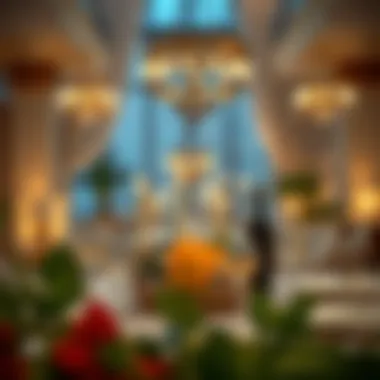
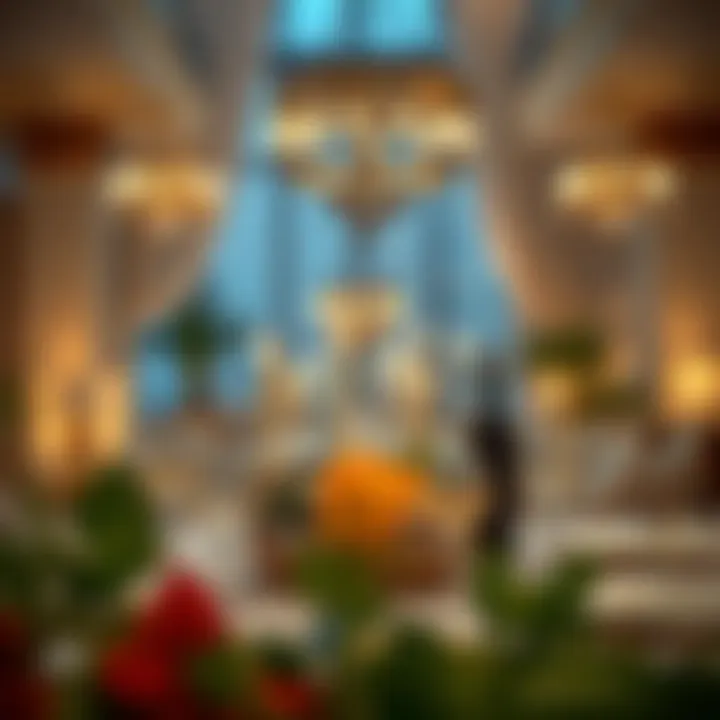
Sustainability During Ramadan
The rise of sustainability has found its place within the very essence of iftar in Dubai. With environmental awareness growing, many local restaurants and hotels are innovating to ensure their iftar offerings minimize waste. Vegan and vegetarian options are gaining ground as more people are looking for sustainable dining experiences.
Initiatives such as food recovery programs are also becoming popular. Restaurants partner with charities to ensure leftover food is donated rather than wasted. This conscious approach aligns seamlessly with the values of Ramadan, further emphasizing kindness and charity.
In addition, many eateries are adopting eco-friendly practices, utilizing biodegradable packaging and reducing plastic usage during iftar events. This pushes the envelope beyond just culinary experiences—it promotes a lifestyle that respects the environment, illustrating how modern sensibilities can harmonize with age-old traditions.
Timings for Iftar in Dubai
Understanding the timings for iftar during Ramadan in Dubai is not merely a question of when to break fast; it encapsulates a blend of spiritual significance and community interaction. As the sun sets, signaling the end of a day of fasting, the iftar moment brings relief and joy. In Dubai, where tradition meets modernity, the specific timing for iftar can vary slightly daily, depending on the sunset, creating an atmosphere filled with anticipation for families and friends gathering around the table.
Connecting with locals and fellow expatriates adds depth to the experience. Observing iftar timing and practicing patience for that moment can profoundly enhance not just the personal experience but also community bonding. Being aware of exact timings allows individuals to respect each other’s practices and traditions, fostering a more harmonious environment.
Additionally, the economy of Dubai also plays a role in influencing iftar timing—restaurateurs and hoteliers tune their operations to keep the city alive, offering special menus and discounts around this time. Thus, knowing the timings can assist in planning visits to culinary hotspots or ensuring a cozy space in bustling neighborhoods.
Daily Iftar Timetable
In Dubai, the daily timetable for iftar during Ramadan varies, typically falling between 6:30 PM and 7:00 PM. Here's a rough outline of how the timings may shift throughout the month:
- Beginning of Ramadan: 6:30 PM
- Mid-Ramadan: 6:45 PM
- End of Ramadan: 6:55 PM
The iftar time is marked by the call to prayer, which plays a pivotal role in signalling the community to break their fast together.
It is worthwhile to check local sources or apps for exact timings, as they can be influenced by geographical factors and sunset variations. Local mosques often publish official timings on their announcements or websites, a practice that reinforces community ties.
Factors Influencing Iftar Timing
When it comes to the timing for iftar, several elements contribute to variations. Understanding these factors is crucial for planning purposes:
- Sunset Timing: The primary factor is the setting of the sun, which marks the end of the fasting period.
- Geographic Location: Depending on where one is located within the emirate, the sunset time may differ slightly. Those situated on the outskirts may have varied timings from those in central Dubai.
- Local Religious Authority Guidelines: Different mosques or Islamic councils may announce slightly different timings, sometimes based on varying methods of calculation.
- Seasonal Changes: Ramadan shifts into different seasons year by year, affecting day length which impacts the exact timing.
The importance of knowing these factors allows pilgrims and locals alike to stay in sync with the community, ensuring that everyone can enjoy iftar together, celebrating this cherished tradition under the night sky.
Culinary Delights of Iftar
Breaking the fast during Ramadan in Dubai is more than just a meal; it represents a rich tapestry of culinary traditions and community gatherings. Food plays a central role in iftar, acting as a bridge that connects families and friends. Whether you're a long-time resident or a visitor, understanding the culinary delights of iftar can significantly enhance your experience during this holy month. Different flavors and aromas waft through the streets, luring individuals into bustling restaurants and intimate family settings.
Traditional Iftar Dishes
During iftar, traditional dishes often take center stage. Dates, a powerhouse of nutrients, are usually the first morsel consumed to break the fast, following age-old traditions. Their sweetness and natural sugars offer a quick energy boost after a long day of fasting. Many also enjoy a refreshing beverage, such as Qamar al-Din, made from apricot, or a cup of rose water lemonade, which cools one down after a warm day.
A key component of Dubai's iftar spread is Luqaimat, small dough balls that are deep-fried and drizzled with date syrup. This dessert shines on tables, symbolizing indulgence and celebration. Also popular are Samboosa, savory pastries stuffed with meat, cheese, or veggies. Savoring the crispy and spiced flavors of samboosa at dusk is a delight for many. Without a doubt, these traditional dishes play a pivotal role in iftar, creating a shared experience filled with warmth and joy.
Popular Iftar Locations in Dubai
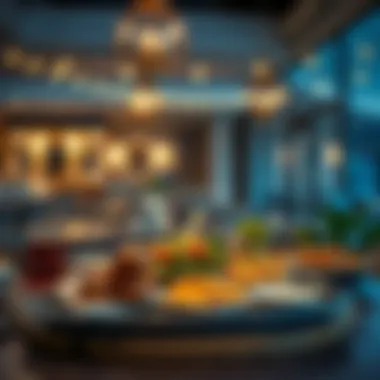

Finding the ideal place to enjoy iftar in Dubai is paramount. Certain locations stand out for their vibrant atmosphere and mouth-watering flavors. Food courts in places like the Dubai Mall and Mall of the Emirates are brimming with various food stalls offering an array of international cuisines, catering to everyone’s palate. Visitors flock here not only for the food but also for the chance to soak in the engaging ambiance.
For a more traditional experience, consider visiting the Jumeirah Mosque, where communal iftars are frequently organized, allowing individuals to connect with locals and fellow visitors over hearty meals. To experience luxury, top-tier hotels like Burj Al Arab and Atlantis, The Palm offer extravagant iftar buffets featuring everything from sushi to shawarma, ensuring a culinary journey like no other.
Innovative Iftar Menus
Culinary creativity flourishes during Ramadan in Dubai, as chefs craft innovative iftar menus that blend tradition with contemporary flair. Restaurants are not shy about experimenting, transforming traditional dishes into modern masterpieces. Imagine a Luqaimat Cheesecake or Lamb Kofta Tacos; these inventive meals put a spin on classic tastes while keeping the essence of Ramadan intact.
Moreover, many eateries provide vegan or gluten-free options, acknowledging diverse dietary needs. As the trend towards sustainability gains momentum, some restaurants even incorporate local ingredients to minimize their carbon footprint during Ramadan. This fresh perspective not only tantalizes taste buds but also highlights a commitment to responsible dining practices.
"Iftar is not just about the food served but the moments shared over it.”
Thus, the culinary landscape during this month in Dubai is not just about breaking a fast; it symbolizes community, acceptance, and love, experienced through the shared joy of food.
Social Aspects of Iftar in Dubai
Iftar goes beyond simply breaking the fast at sunset during Ramadan; it is a vital social tradition that fosters a sense of community and togetherness among friends, family, and neighbors. In Dubai, a city where diverse cultures intersect, the social aspects of iftar take on even greater significance. For residents and visitors alike, these moments serve not only as a time for nourishment but also as opportunities for cultural exchange and celebration.
The ritual of gathering for iftar brings people together from different backgrounds to share a meal, breaking down barriers and reinforcing communal bonds. This gathering acts much like a thread that stitches the rich tapestry of Dubai’s multi-national population. Special attention is often given to how these gatherings are arranged, reflecting the warmth and hospitality that is central to Emirati culture.
Community Gatherings
Community gatherings during iftar are often marked by an atmosphere filled with joy and camaraderie. It's more than sipping on dates and water, as the age-old tradition goes. Neighbors and friends come together, creating a vibrant mosaic of cultural practices. Many choose to set up large tables in public parks, offering free meals to all. Such gatherings inaugurate a spirit of generosity and unity that resonates throughout the community.
Some prominent venues include family-owned restaurants in local neighborhoods where everyone knows each other’s names. These social settings allow residents to establish relationships while indulging in traditional dishes such as lentil soup, date compote, and various meat dishes. The backdrop of lively conversation, laughter, and shared experiences transforms these meals into memorable events that linger long after Ramadan is over.
Government initiatives also encourage community bonding during iftar. For example, free public iftar events are organized by local authorities, driving home the sense of unity and inclusiveness in Dubai. The engagements during these events not only enhance social interaction but also create opportunities for cultural appreciation.
Iftar Events and Festivals
Iftar events and festivals capitalize on this communal spirit, turning the act of breaking the fast into grand celebrations. Communities, organizations, and municipalities put together elaborate festivals to engage both locals and expatriates. Such events often feature a myriad of food stalls, activities, and entertainment, creating an inviting atmosphere for all.
One notable event is the Ramadan Night Market, which showcases a blend of traditional Emirati and modern culinary delights. Besides food, there are plenty of family-friendly activities. Cooking demonstrations, cultural workshops, and even performances by local artists are all a part of the deal, ensuring that there is something for everyone.
Local neighborhoods take pride in their unique celebrations, allowing residents to contribute dishes and share their culinary heritage. It’s the perfect way to combine cultural background with culinary techniques, making iftar festivals a true celebration of diversity.
In summary, the social aspects of iftar in Dubai signify the coming together of communities, allowing individuals to connect over shared experiences. Whether through small gatherings or large festivals, these moments serve as a reminder of the spirit of Ramadan stripped of extravagance but adorned with a profound sense of belonging.
Iftar and Real Estate in Dubai
Fasting during Ramadan culminates at iftar, a meal that not only warms the heart but also has ripple effects across various sectors. Among these, the real estate market in Dubai stands out, especially during this holy month. The intersection of cultural practices like iftar with the property landscape paints a unique picture. Real estate investors need to recognize the trends influenced by Ramadan and how community gatherings based around iftar can contribute to both commercial opportunities and property demand.
Impact on Property Markets
Iftar contributes to the vibrancy of Dubai's neighborhoods, and this has tangible effects on property values and rental markets.
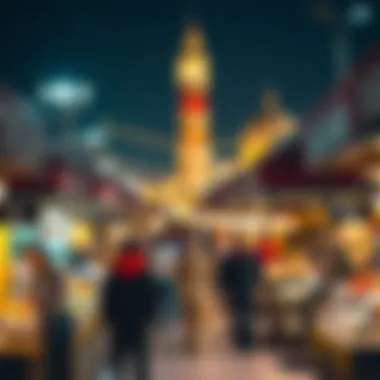
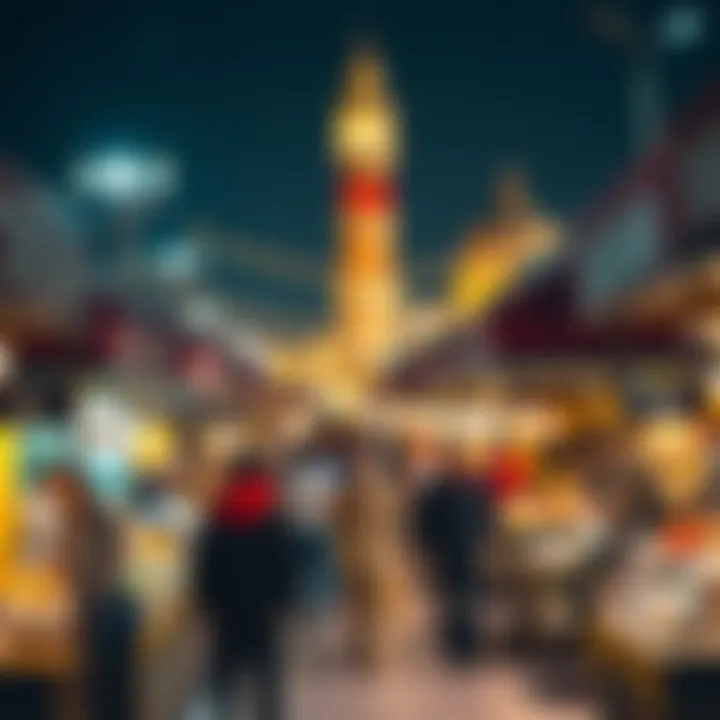
- Increased Demand for Rental Spaces: As families gather for iftar, many expatriates and locals alike prefer larger accommodations to host gatherings. This can result in a spike in demand for spacious apartments or villas that can accommodate guests, particularly in communities known for their family-friendly amenities.
- Feedback Loop of Community Engagement: During Ramadan, properties near mosques or popular iftar venues witness increased foot traffic, presenting investment opportunities. The lively atmosphere can enhance the appeal of residential listings, where proximity to communal gatherings becomes a selling point.
- Commercial Real Estate Growth: Restaurants and hotels often flourish during this time as they offer special iftar menus and promotions. Investors should observe which areas attract more diners and consider investing in commercial properties that cater to this spike in demand.
The interplay between community gathering spots and property prices creates an evolving market. Investors need to balance their portfolios with properties that benefit from this cultural phenomenon.
Hospitality Industry during Ramadan
The hospitality sector in Dubai experiences a remarkable season during Ramadan, and this is interlinked with iftar traditions. Hotels and restaurants roll out the red carpet with iftar offerings, contributing to the overall market’s dynamism.
- Premium Dining Experiences: Establishments like the Burj Al Arab and The Palace Downtown curate exceptional iftar experiences with breathtaking settings and exquisite menus. The allure of fine dining during this month generates substantial revenue for the hospitality sector.
- Increased Bookings: Many hotels offer special Ramadan packages, encouraging locals and tourists to experience the city in a unique setting. This leads to a boost in occupancy rates, driving the need for more hotel investments in the long run.
- Event Hosting: Companies and organizations often host corporate iftar events, furthering restaurant and hotel engagement. This trend opens possibilities for the development of event venues that cater specifically to corporate clients during Ramadan.
Investors who keep an eye on the trends shaped by the hospitality industry during Ramadan can position themselves advantageously. The promise of higher returns beckons those willing to take the plunge into sectors that flourish under the spirit of iftar.
"The ritual of breaking bread during iftar symbolizes unity and joy, but its influence on the real estate market underscores a deeper connectivity within the fabric of Dubai's societal landscape."
In summary, understanding how iftar intertwines with real estate dynamics in Dubai during Ramadan can illuminate potential pathways for investment and development. Timing and strategic positioning are essential to ensure that one doesn't miss the bus during this vibrant season.
Iftar Etiquette and Guidelines
When participating in iftar, understanding etiquette and guidelines can truly enrich the experience for both hosts and guests. This is especially important in a multicultural melting pot like Dubai, where traditions might vary, yet the essence of Ramadan remains universally respected. Practicing proper etiquette not only honors the spirit of the occasion but also fosters goodwill among diverse cultures.
Do's and Don'ts of Iftar
The swift approach of iftar signals a time of coming together, and adhering to certain do's and don'ts can make the gathering even more fulfilling. Here’s a closer look:
Do's
- Be Punctual: Arrive on time. Timing is crucial. Iftar typically begins at sunset, so gather before the call to prayer.
- Observe Respectful Behavior: Especially during Ramadan, maintaining politeness and consideration for others is vital. This means avoiding disruptive dialogues or loud laughter.
- Participate in Prayers: If possible, join in the Maghrib prayer before breaking the fast. This is not only a respectful gesture but can also bring a deeper connection to the gathering.
- Bring Food or Drink to Share: Offering a dish or a drink as a guest is a pleasant way to show appreciation. It also symbolizes unity as everyone enjoys varying tastes.
- Dress Modestly: While Dubai is modern, modesty remains important during Ramadan. Opt for conservative clothing to honor the occasion.
Don'ts
- Don't Eat or Drink in Public: Even if you are not fasting, it’s polite to refrain from eating or drinking in public areas during daylight hours.
- Avoid Discussing Sensitive Topics: Ramadan is a holy time, so conversations should avoid contentious subjects like politics or religion that might bring unnecessary tension.
- Don’t Overindulge: It’s easy to pile a plate high after a day of fasting, but moderation is key. Respect the hosts' food and ensure there's enough for everyone.
- Don't Use Your Phone Excessively: While it's natural to share moments online, being glued to a smartphone during iftar can come off as disrespectful. Focus on the people and the atmosphere around you.
Adhering to these guidelines not only enhances your iftar experience but also reflects the values of compassion and community during Ramadan.
By observing these important nuances, participants can ensure that their iftar gatherings resonate with the deeper moral lessons of this holy month. Whether you are a guest at an expatriate gathering, a local family’s home, or a lavish restaurant breaking bread with strangers, maintaining these etiquettes is essential to celebrating the beautiful Islamic traditions of Ramadan.
Finale
As we draw our journey through the essence of iftar in Dubai, it's clear that this meal signifies much more than merely breaking the fast. It serves as a focal point of community, culture, and cuisine within the vibrant fabric of Dubai's society during Ramadan. Reflection on the iftar experience holds immense value for both residents and visitors. It shines a light not only on deep-rooted traditions but also on the modern interpretations that continue to evolve with the city.
Reflecting on the Iftar Experience
When one thinks of iftar in Dubai, it’s useful to acknowledge the communal aspect this meal fosters. Gatherings during iftar are deeply ingrained in the calendar of Ramadan. Families reunite, friends come together, and diverse communities share time around the dining table. This social interaction enhances the sense of belonging, transforming what might be a solitary experience into a collective celebration.
Flavors play a prominent role in this experience, often sparking conversations and memories that last for years. Traditional offerings like dates and lentil soup pave the way for more elaborate spreads, showcasing a rich blend of culinary traditions from around the Middle East and beyond. For the discerning palate, restaurants often roll out innovative menus that put a twist on classic dishes, making dining out a delightful adventure.
In this unique space, the intersections of culture, hospitality, and tradition become a living tapestry, reflecting the dynamic essence of Dubai. Visitors, be they expatriates, tourists, or investors, gain insights not just into the food but the heart of what Ramadan means to the city's people.
In contemplating iftar’s multifaceted nature, we realize its relevance extends beyond sustenance. It holds a mirror to societal values like generosity, spirituality, and unity. Taking a moment to engage in this experience reveals the beauty of diversity in Dubai and how the act of breaking bread can bridge gaps among individuals from all walks of life.
Thus, as the sun sets and the call to prayer echoes, iftar stands as a reminder—a sacred pause in daily routines, celebrated with zest and sincerity. As you navigate through Ramadan 2023 in Dubai, let the significance of iftar guide your explorations and reflections, enriching your understanding of this enchanting city and its people.



